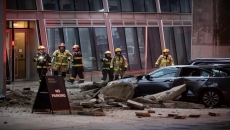Global trials examining the potential of blood thinners to treat moderately ill COVID-19 patients have proven so successful its Canadian investigators say clinicians should immediately start using them in standard care.
Investigators at Toronto's University Health Network say interim results of clinical trials spanning five continents in more than 300 hospitals suggest full-dose blood thinners could significantly avoid severe cases that are now straining hospital ICUs.
The study involved more than 1,300 moderately ill patients admitted to hospital, including some at UHN.
Investigators say full doses of Heparin improved outcomes and decreased the need for life support.
The full dose was also more effective than the lower dose typically administered to prevent blood clots in hospitalized patients.
Critical care physician Ewan Goligher, co-chair of the therapeutic anticoagulation domain of the trial, says the findings could significantly transform care.
“Having cared for so many severely ill COVID-19 patients and witnessed the suffering involved for patients and their loved ones, it is profoundly gratifying that together we have discovered a treatment that can prevent patients from becoming severely ill and improve their recovery,” Goligher, also a scientist with the University Health Network, said Friday in a release.
Ryan Zarychanski, associate professor, hematologist and critical care physician at the University of Manitoba, said the findings were promising.
"In a disease with a limited number of effective therapies, our results have the potential to define a new standard of care for moderately ill hospitalized COVID-19 patients around the world," Zarychanski said.
Doctors noticed early in the pandemic that COVID-19 patients suffered an increased rate of blood clots and inflammation. This led to complications including lung failure, heart attack and stroke.
Back in December, investigators found that giving full-dose blood thinners to critically ill ICU patients did not help, and was actually harmful.
The trials are supported by international funding organizations including the Canadian Institutes of Health Research, the NIH National Heart, Lung & Blood Institute in the United States, the National Institute for Health Research in the United Kingdom, and the National Health and Medical Research Council in Australia.






